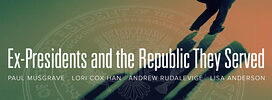Lead Essay
Paul Musgrave argues that both formal laws and informal norms shape an ex-president’s obligations and opportunities. Not only that, but a sitting president’s expectations about their future will shape their behaviors while they serve. Musgrave recommends several measures both formal and informal that he argues would lessen the influence and the dangers that ex-presidents can present.
Response Essays
Lori Cox Han characterizes the norms governing former presidents as mostly informal. Under them, modern ex-presidents have pursued a wide variety of activities. Regarding the newest member of the club, she writes, “The many things that made Donald Trump unique as a candidate and president… are exactly the things that will drive his post-presidential years.” She predicts that we may see renewed attention to post-presidential ethics, and perhaps new formal restrictions on former presidents’ behavior.
Lisa Anderson writes that the integrity of the institution of the presidency is the most important consideration in crafting our rules and norms for ex-presidents. She agrees that presidential libraries and foundations should likely be abolished, among other reforms. She closes by recommending a set of new disclosure requirements for presidential candidates, writing, “the character of our ex-presidents will never be better than the quality of our presidents.”
Prof. Andrew Rudalevige invokes Machiavelli to discuss the institution of the former president. Those who have served are likely to be motivated by the judgment of posterity, and that judgment should be used to keep them acting in honorable and useful ways. To that end, presidential recordkeeping should be reformed and centralized, aiding scholars in their work while limiting former presidents’ powers to hide documents from public view.

